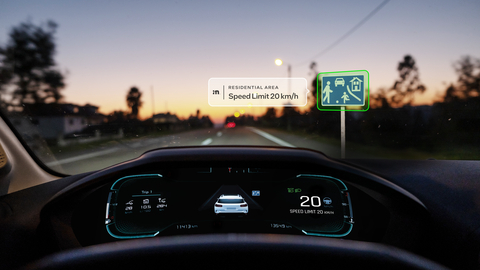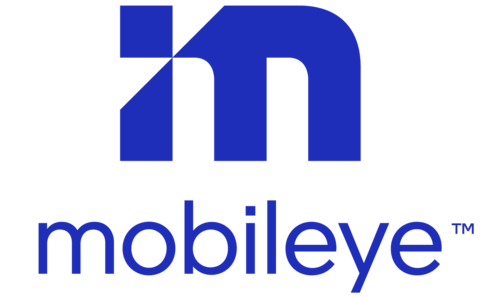JERUSALEM--(BUSINESS WIRE)--Mobileye has introduced the world’s first vision-only Intelligent Speed Assist (ISA) solution for automakers, following testing and certification across Europe. The camera-only solution, launching in production vehicles this year, helps global automakers meet new European Union (EU) General Safety Regulation (GSR) standards requiring automatic sensing of speed limits in all new vehicle models, without the need to rely on third-party map and GPS data.
The new software, designed for Mobileye’s EyeQ platform, has been certified for use in all 27 EU countries as well as Israel, Norway, Switzerland, and Turkey. The EyeQ4 and EyeQ6-based ISA system allows OEMs whose vehicles already integrate these chips to meet the new standards merely by updating the EyeQ’s existing software, without any new hardware requirements.
The Mobileye ISA system is expected to be integrated by a major global auto group into two vehicle brands for models going on sale in Europe later this year, with three other global automakers following close behind in 2024 and beyond.
“This is a major accomplishment for Mobileye, because we’ve proven to the industry not only that achieving GSR-compatible vision-only ISA is possible, but also that it performs better than traditional map-based solutions,” said Dr. Gaby Hayon, Executive Vice President of Research and Development at Mobileye.
The certified solution, resulting from more than two years of work building on Mobileye’s two decades of experience in computer vision and machine learning, is the industry’s first of its kind. Current alternatives rely on a combination of cameras and low-resolution maps to meet the EU standards, a solution that typically brings higher cost with complexity and integration efforts, while providing less reliable performance.
Mobileye has developed several cutting-edge technologies that upgraded the legacy traffic sign recognition technology to meet GSR requirements, including:
- Traffic sign relevancy technology that identifies whether a speed sign is relevant to a specific lane,
- Signature-based classification that loads the ‘signature’ of a new traffic sign to the vehicle, even for new signs that were introduced after the vehicle’s manufacture,
- OCR-based city entrance identification for European-style signs,
- Advanced search engines that allow finding examples of rare signs in Mobileye’s huge clips database and integrate them into the system, and
- Road-type classifier that can work out the right speed, even when traffic signs are missing, by using different cues in the scene to detect the road type.
“Mobileye’s 400-petabyte database of driving footage, gathered from around the world, enables us to rapidly meet the growing requirements of automotive safety regulators with new software designed for our existing driver-assist platforms,” said Hayon. “After successfully surpassing GSR ISA standards during stringent testing, we look forward to collaborating with automakers to implement this lifesaving technology in Europe and beyond.”
As of July 2024, all new passenger vehicles sold in the EU must meet specific GSR ISA requirements, as confirmed by rigorous testing, such as being able to detect static and dynamic message speed-limit signage across hundreds of signs, with thousands of country-specific variants, including both explicit and implicit signs, and in harsh weather and adverse lighting conditions. They must also understand temporary speed limits for construction, accidents, or other issues, often given by digital signage, and implicit speed limits such as city entrance.
Speeding contributes to one third of fatal vehicle crashes in EU Member States according to the European Road Safety Observatory, and experts say the new regulations could reduce collisions by as much as 30 percent, and fatalities by up to 20 percent. Under the new regulation, all systems will be required to let drivers know what speed limits are in effect either actively- in which a vehicle automatically slows down gently towards a posted limit--or passively, in which the ISA system alerts drivers when they exceed posted limits.
Six independent labs across five different European countries have tested and confirmed that Mobileye’s ISA software meets or exceeds the EU's required standards, with additional testing and certification underway. In the future, Mobileye will continue advancing the system to ensure new sign recognition over the next 14 years per GSR certification requirements.
About Mobileye Global Inc.
Mobileye (Nasdaq: MBLY) is a leader of the mobility revolution with its autonomous driving and driver-assistance technologies, harnessing world-renowned expertise in computer vision, artificial intelligence, mapping, and data analysis. Since its founding in 1999, Mobileye has pioneered such groundbreaking technologies as REM™ crowdsourced mapping, True Redundancy™ sensing, and Responsibility Sensitive Safety (RSS). These technologies are driving the ADAS and AV fields towards the future of mobility – enabling self-driving vehicles and mobility solutions, powering industry-leading advanced driver-assistance systems and delivering valuable intelligence to optimize mobility infrastructure. To date, more than 140 million vehicles worldwide have been built with Mobileye technology inside. In 2022 Mobileye listed as an independent company separate from Intel (Nasdaq: INTC), which retains majority ownership.
“Mobileye,” the Mobileye logo and Mobileye product names are registered trademarks of Mobileye Global. All other marks are the property of their respective owners.
Forward-Looking Statements
This press release contains forward-looking statements. Statements in this release, including statements with respect to the offering, that are not statements of historical fact are forward-looking statements and should be evaluated as such. These statements often include words such as “anticipate,” “expect,” “suggests,” “plan,” “believe,” “intend,” “estimates,” “targets,” “projects,” “should,” “could,” “would,” “may,” “will,” “forecast,” or the negative of these terms, and other similar expressions, although not all forward-looking statements contain these words. We base these forward-looking statements or projections on our current expectations, plans and assumptions that we have made in light of our experience in the industry, as well as our perceptions of historical trends, current conditions, expected future developments and other factors we believe are appropriate under the circumstances and at such time. You should understand that these statements are not guarantees of performance or results. The forward-looking statements are subject to and involve risks, uncertainties and assumptions and you should not place undue reliance on these forward-looking statements. Although we believe that these forward-looking statements are based on reasonable assumptions at the time they are made, you should be aware that many factors could affect our actual financial results or results of operations and could cause actual results to differ materially from those expressed in the forward-looking statements. Detailed information regarding these and other factors that could affect Mobileye’s business and results is included in Mobileye’s SEC filings, including the company’s Annual Report on Form 10-K for fiscal year 2022, particularly in the section entitled “Item 1A. Risk Factors,” and in the preliminary prospectus and in any subsequent filings with the SEC relating to the offering. Copies of these filings may be obtained by visiting our Investor Relations website at ir.mobileye.com or the SEC’s website at www.sec.gov.




